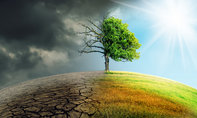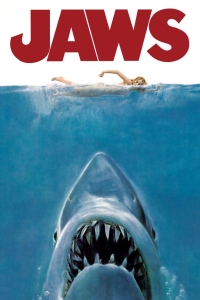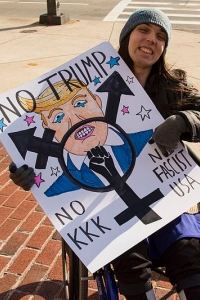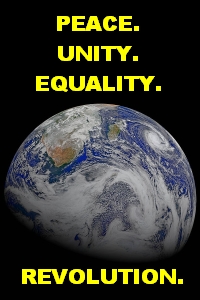- About Us
- Columns
- Letters
- Cartoons
- The Udder Limits
- Archives
- Ezy Reading Archive
- 2024 Cud Archives
- 2023 Cud Archives
- 2022 Cud Archives
- 2021 Cud Archives
- 2020 Cud Archives
- 2015-2019
- 2010-2014
- 2004-2009
 |
It’s Time to Change the Whole Planet |
Part I:
THAT ENDLESS NIGHTMARE
Fear is primal. It’s a powerful defense that makes us act to escape or combat that which threatens us.
In 1975, the movie that launched the summer blockbuster was in theaters. The young Steven Spielberg’s horror/thriller flick was unlike any movie before it, and the marketing was tremendous. The studio spent $700,000 just on television spots—unprecedented for a film at the time.
That movie was Jaws, and Universal Pictures might have been trying anything to get people to see it. Thanks to a production plagued by weather problems, the challenges of ocean filming, and mechanical sharks that kept breaking down, the $4 million budget ballooned to a final $9 million. Spielberg had intended to have his killer protagonist featured visibly and prominently, but with the mechanical sharks never working, he had to improvise. “The film went from a Japanese Saturday-matinee horror flick to more of a Hitchcock, the less-you-see-the-more-you-get thriller,” he later said.
The marketing paid off: People wanted to see this movie. They wanted to be scared. They wanted their adrenaline to rush and their hearts to pound in their chests. They wanted to experience that primal emotion. And they headed to the theaters in droves, resulting in a box-office take of $470 million--$1.8 billion in 2018 dollars. That’s not a bad return for a $9 million film, even with the exorbitant marketing costs.
I was four years old when Jaws was being promoted on TV. I knew nothing about mechanical sharks and budget overruns and Steven Spielberg, but I knew about fear. And for whatever reason those spots didn’t really scare me. There was the one with the woman in the water when the shark began bumping into her. And there was the one with the panicked kids screaming and fleeing at the beach as the Great White’s fin cut the water toward them. You never saw anyone getting eaten in those spots—heck, you never even saw the shark.
What did stick in my mind was the image of the release poster: a woman swimming on the surface, viewed from the side; beneath her, rising up to eat her, a monstrous shark with a huge mouth full of sharp teeth. But I understood the concept of fact vs. fiction, and I knew that this was just a story and nothing to really be afraid of. That image didn’t scare me, but it made a strong impression on me.
I began kindergarten that September, just as I turned five. I felt like a big boy, getting to walk the two blocks to school and back. One day, I walked home with a friend: We came down Vine Street from the school to the corner, where a crossing guard would get us safely across Third Street. But where Vine met Third there was a big, wide puddle that wrapped around the curb of that corner. We were boys, so instead of going around it, of course we leaped over it—mostly. We ended up with wet sneakers.
That night, I replayed that walk home in my dreams. It was exactly like what had happened for real—until I stood on the curb, preparing to jump the puddle. The perfectly still mirror of the water’s surface reflected a brilliant blue sky, fluffy white clouds, and colorful autumn leaves on the tree above. As I stared into that reflection, I was overcome by a sense of dread, and I didn’t know why. There was nothing more idyllic than the sky, clouds, and tree in that inch-deep puddle, but I couldn’t shake the fear that I felt.
Finally, I steeled myself and I leaped over it, just like I had in real life—but as I left the curb and went airborne, Jaws suddenly burst out of the water, all teeth and maw, clamped down on my body, and hauled me under!
I woke up screaming. My mother came running. It had been my first real nightmare, and it had utterly terrified me. And the kicker? I had the same nightmare every night for what must have been a week. Eventually it became every few nights, then once a week, then one a month, then a couple of times a year…
Part II:
DON’T BE AFRAID OF FEAR
That was 43 years ago. To this very day, once in a while, I have that exact nightmare again. It's like replaying a movie that I'm part of, and I never know why I feel that sense of dread. But every time I jump over the puddle, that shark breaches and chomps on me and I wake up in sheer terror. Every couple of years, I relive that nightmare. I don’t wake up screaming, but I do wake up absolutely terrified. Why not? I’d just been eaten by a shark—again!
So if Universal and Spielberg are wondering if their marketing of fear worked—well, it sure did here. I can watch the movie and enjoy it, and nothing about it scares me, but that little-boy nightmare still comes back to haunt me every so often. I don’t fault them for it; it’s rather amusing, after all. When it comes to movies, many of us really do want to be scared. We enjoy the fun involved, because we know that a movie is just a movie. Sharks aren’t really coming to get us. Those who die on screen didn’t really die. It’s a safe fear, because intellectually we know that we’re going to be all right.
But the primitive part of your brain doesn’t understand the difference between movies or real life. Fear is fear; it believes that the threat is real, and it only wants to protect you from that threat. And that’s good, because we need to feel fear for all of the real-life, waking nightmares that we must live with every single day.
Fear is primal. In the human brain, it evokes the “fight or flight” response to a perceived threat: We either believe that we can confront the thing that’s threatening us, or that we must run away from it. It doesn’t have to be a movie shark, though. There’s a lot to fear for real in the world today. In the last year, we have become very fearful. We have become fearful of the social destruction in the United States and, indeed, across the world.
We fear the negative changes as Donald Trump and the alt-right discriminate, hate, build walls, and undo everything that is good about America.
We fear that our children might be shot to death in another mass school shooting because the Republicans are so defensive of gun rights that they’d rather be complicit in as many senseless deaths as it takes to ensure those rights.
We fear the suffering and death that awaits those in need of medical care that they won’t get, food that they won’t have, bills that they won’t be able to pay, and increased taxes that they’ll be required to pay so that the rich will keep getting richer.
We fear the freedoms of our nation slipping away, and we fear the influence from the rich and powerful in this country… and from the rich and powerful in other countries.
Such horrors are global, of course. It’s nice to dump on Trump and the USA, but each nation has its own host of terrible things going on that are entirely their own doing.
People fear persecution for their religious beliefs or lack thereof.
Women fear being forced into genital mutilation and forced into marriage and forced into sex and forced into subservience.
People fear militants with guns destroying their villages and their cities, and raping, kidnapping, and killing their loved ones.
They feel oppression by dictatorships, authoritarian regimes, and monarchies where the avaricious few use their great power to tread on those beneath them.
They fear destruction on a global scale thanks to maniacs with nuclear weapons and the greedy in power denying science and seeking to destroy the planet in the name of more money.
Why should anyone ever have to fear any of the things that I’ve mentioned?
Part III:
SOCIAL REVOLUTION
They shouldn’t. It’s not right. But it’s the way we’ve been since our barbaric, primitive days. This ten-thousand-year-plus experiment in developing a human civilization must grow beyond what it is. Until then, most of us will live in fear—a lot of fear. No. No more. It must stop. We must draw a line in the sand and not allow the insanity to further destroy the lives of billions. The world needs global social change.
Fear is primal. But we can combat fear. That nightmare still returns to me from time to time, and it wakes me in a terrified sweat, but it’s more a reminder to me that fear is a response that I can’t control. But I know that I can shake it off, calm myself, remember that it’s just a bad dream, and go back to sleep.
When we feel fear, we often choose flight over fight. When we’re fearful of social injustices, flight has often worked in this country—because we know that, no matter how bad things are, we’re just another election away from undoing it, so we’re apt to grudgingly accept those bad things. Apathy might not seem like flight, but it’s certainly not anything like fighting. It’s time to stop fleeing from social fears. Social upheaval has changed this nation before, and it is again. The protests continue. The investigations continue. Eventually, those responsible for their behavior will be held accountable—either by being ousted from office, charged with crimes, or hit hard in their bank accounts.
But we can’t just wait until everything gets this bad before we choose fight over flight. We need to always fight. Fear must now be the great motivator to work proactively and endlessly to patch our flawed system and prevent such horrible injustices in the future. Maybe we need to amend the Constitution so that there is no question that the president cannot pardon himself, and indeed to limit his pardon power to prevent him from pardoning anyone in a way that benefits him, such as his colluders, co-conspirators, and family. Perhaps we need to establish a permanent special prosecutor’s office that will always independently investigate political figures, always be free from the threat of being fired by the person being investigated, and always be untouchable by partisan interests and sham investigations in Congress.
And that’s just in America. This should be happening everywhere. Those who believe in equality and worldwide harmony should do the same sorts of things. We should all campaign to make our nations better. We should all speak out when the actions of one nation or its maniacal leaders impact our nations. We should all do more than just hope and wish that things will get better. We should act to effect change, no matter how small or how big those actions are.
Fear is primal. It’s about survival.
It’s time to go beyond survival. On a global scale, it’s time to work towards unifying the human race. It won’t happen overnight, but we must begin that long trek. It’s time to end rule by the powerful few. It’s time to end money and greed and replace it with social equality. It’s time to end oppression by the religious, the politicians, the rich—by anyone who oppresses. It’s time for the planet to change for the better, and for the betterment of humanity.
That’s a good way to channel fear, right? We can all rest assured that when we put our fear to that good use, those privileged few—the rich, the powerful, the elite—will be feeling plenty of fear of their own. They’ll want to turn their fear into fight, too, but let the masses decide that world peace, global unity, and universal equality are what truly matter—and that no one should ever be oppressed again.
Fear is primal. Fear is good.
So is worldwide social revolution.
David M. Fitzpatrick is a fiction writer in Maine, USA. His many short stories have appeared in print magazines and anthologies around the world. He writes for a newspaper, writes fiction, edits anthologies, and teaches creative writing. Visit him at www.fitz42.net/writer to learn more.
